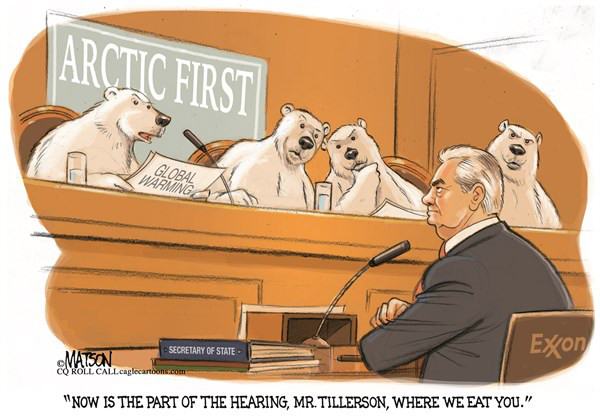Climate Fuel

On September 19, San Francisco and Oakland served papers on five of the world’s largest oil companies — BP, Chevron, ConocoPhillips, ExxonMobil, and Shell — to pay for their role in climate change.
Both cases, filed separately in state court with similar language and identical tables of content, demanded the creation of an “abatement fund” to protect the cities against rising tides. The infrastructure cost — from seawalls to sewers — could be in the billions. In San Francisco’s suit, the city predicts it will cost taxpayers $5 billion to build a better seawall. Oakland issued a $40 million bond in 2014 to upgrade its sewer system against floodwaters.
Cases like this aren’t exactly new. Two adjacent counties, Marin and San Mateo, and one other city in California filed similar suits earlier this year. And back in 2008, when the small town of Kivalina (population: 374 from a 2010 census) found itself sinking on Alaska’s coast, local officials also tried to get oil companies to pay up.
But federal courts ruled that the Clean Air Act voided any kind of suit in Kivalina’s case — the fossil fuel industry was already “paying” for climate change by simply following EPA rules; any further complaints should be filed with that agency. Never mind the greenhouse gases emitted before 1970, when the EPA was created and the Clean Air Act put in place. Or the dark money the fossil-fuel industry funneled into deceptive campaigns against climate science. These companies purposefully delayed public action on climate, and now that it’s too late, taxpayers are slated to pay the consequences.
Or maybe not. This year’s cases are exciting because they gives California courts the chance to take a smarter stance. The lawsuits raise tough questions that will impact us here in Santa Barbara, nestled between the rising Pacific and the burning Santa Ynez mountains: Who should pay the hefty cost for adapting to climate change? Who has the right to be compensated? And if successful, could cities take Big Oil to court for battling more forest fires? Could farmers sue for crop losses due to drought?
An unrelenting wave of powerful hurricanes — Harvey, Irma, Maria — are the backdrop. There’s a sense of urgency, a shift in our country’s attitude toward climate change and being seriously prepared for it, that didn’t exist nine years ago when Kivalina’s case sank. Sea-level rise is easy to measure, and prediction models are more accurate than ever, making it harder for oil companies to dodge and play defense.
Given global warming’s positive feedback loops and the recent delay of Senate Bill 100 (upping California’s renewable energy goal to 100 percent by 2045), it’s unlikely that tides will recede anytime soon. In the meantime, we shouldn’t be forced to subsidize oil companies for their decades of lies and deception on climate change. Nor should we have to retreat.



